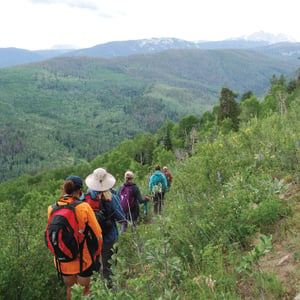 Did you know that climate change has intensified dry, windy summers and doubled the number of forest fires since 1984? Next week, Canada celebrates National Forest Week, but that does not mean that we can’t start celebrating forests in the US as well, because the Global Wildfire Awareness Week is October 1st until the 7th. Canada’s National Forest Week was created to invite people to learn more about how to protect our forests and to raise awareness about the values that our forests offer, which is similar to the U.S.’s National Forest Week in July.
Did you know that climate change has intensified dry, windy summers and doubled the number of forest fires since 1984? Next week, Canada celebrates National Forest Week, but that does not mean that we can’t start celebrating forests in the US as well, because the Global Wildfire Awareness Week is October 1st until the 7th. Canada’s National Forest Week was created to invite people to learn more about how to protect our forests and to raise awareness about the values that our forests offer, which is similar to the U.S.’s National Forest Week in July.
In Canada, National Forest Week began in 1920 as a Fire Prevention Week because at the time, there was no shortage in lumber and the greatest threat to forests was human-caused fires. As time changed and more forests were lost due to logging, it was renamed National Forest Week to encompass a wider range of human and environmental aspects of forest management. Today, we all celebrate forests in our own way, while all agreeing that forests are vital to human life because they are fundamental to our economy, functioning ecosystems, culture, traditions, history, and our future.
In 2017 and 2018, the western United States experienced the deadliest and most destructive wildfires in U.S. history. Fueled by drought and extreme winds, the fires took more than 100 lives, destroyed thousands of houses, exposed millions to unhealthy air, and brought one of our nation’s largest utility companies to bankruptcy. In this new age of fire, especially in our mountainous region, wildfire mitigation plans are of extreme importance. Eagle County has adopted a Community Wildfire Protection Plan, and it has been the guiding document behind wildfire mitigation in the County since 2005. The plan informs of tactics that include vegetation manipulation, fire-resistant construction materials, water supply development, access improvement, and evacuation planning. To learn more about the Community Wildfire Plan visit bit.ly/CommunityWildfirePlan
There are roughly 350,00 acres of national forest in Eagle County, and we have many committees dedicated to protecting the forest with a variety of methods. However, it’s still vital that individuals in the community play a role too. It is the responsibility of everyone that works, lives, and plays in Eagle Counties forests to help maintain healthy forests, prevent deadly wildfires, and celebrate the beautiful forests we are still surrounded by.
Three tips for preparing yourself for wildfire season in Eagle County.
- Learn how to add defensible spaces around your home. The National Fire Protection Agency’s Firewise USA Program teaches people how to adapt to living with wildfire and encourages neighbors to work together and take action now to prevent losses. https://www.nfpa.org/Public-Education/Fire-causes-and-risks/Wildfire/Firewise-USA.
- Be prepared - If you are forced to evacuate, make sure you have a checklist for valuables that you need such as identification, medicine, or important documents. Know your escape routes and safety zones. Recognizing safety zones along your escape route is important because the route could be compromised because of extreme fire or traffic.
- Pay attention to fire restrictions - If you have to use an open flame outside, be careful and check if there are any fire restrictions, this includes campfires, barbecues, smoking, and discharging firearms.
Visit bit.ly/ECFireRestrictionsInfo online to learn about current fire restrictions.








